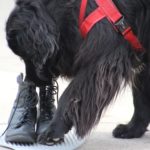Nose work, scent work, scent detection, sport detection…
…It doesn’t matter what you call it – it’s a sport for pet dogs, based on real life bomb, drug or contraband detection.
What are the dogs searching for, if it’s not bombs or drugs?
In this sport, dogs search for specific essential oils. Each trialing organization in nose work has their own preferred oils – birch, wintergreen, anise, clove, pine and thyme are just some of the oils that dogs learn to search for.
When I think of sniffing out stuff I think of Beagles or Bloodhounds, or police dogs like German Shepherds. Is this sport only for working dogs?
This sport is for all breeds and all temperaments – I’ve witnessed amazing work from Papillons, Cockers, Bernese Mountain Dogs, Newfoundlands, Poodles and many other breeds, each participating with great enthusiasm and talent.
My dog is older – can she do this?
Absolutely! This is a great sport for an older dog (or handler for that matter) – especially one that may be suffering from physical limitations. And by the way, even if you’ve got a young dog that just wants to say ‘hi!’ to everyone and play with every other dog, this sport, and particularly these classes are set up so that dogs can learn to focus on the task.
My dog is deaf/blind – can he participate?
Dogs that have various handicaps are welcome in this sport. Just because a dog is blind or deaf doesn’t mean they can’t use their nose incredibly well. Sometimes adjustments have to be made in training or in the training environment – but it’s amazing how well the dogs adapt.
Where do dogs search?
The great thing about this sport is that it can really be done anywhere. At home, at a park or while on a road trip – you can set up a search for your dog. In a class or trial situation various searches are set up covering the four ‘elements’ of nosework: interior spaces, exterior areas, vehicles and containers (usually boxes, suitcases or bags of some sort).
What kind of training does my dog need to join a class?
None! No prior training is required and your dog can be as young as 4 months. Basic obedience is not essential for learning nose work. The only skill that is essential for each dog in this sport is to be able to be left either in the car or in a crate and rest quietly while waiting for his or her turn.
What kind of equipment do I need to get started?
You’ll need your dog, some treats and 3 or 4 cardboard boxes to get you started. But as you advance in the sport, you’ll need an odor kit (a vial of essential oil, some q-tip swabs and something to hold them in, like a small tin). Many people participating in nose work also use a comfortable working harness and a long, light leash (usually 10-12 feet long). All of these things are easily transportable in your car or even a knapsack.
My dog has some behavioural issues – can she join a class?
Whether your dog is suitable for class depends on the issue. Many dogs that are reactive to other dogs are able to participate in nose work. Dog work one at a time and rest crated or safely in a vehicle between searches so reactive dogs can enjoy nose work too. If your dog is shy or fearful, nose work can build confidence and enthusiasm for new places and situations.
Can my dog and I earn titles and ribbons?
Yes! There are nose work trialing organization in Canada and the US. Trialing may not be for everyone or every dog due to variable conditions at trialing sites, but there are lots of opportunities to try.
Why Clever Canine teaches this sport:
- Because working a dog’s brain is just as important as working his/her body
- Because it builds an incredible bond between dog and owner – team work is essential in this sport, with the dog leading the way.
- Because dogs love it!
Learn more here:
In Canada – Sporting Detection Dogs Association (SDDA)
In the US – National Association of Canine Scent Work (NACSW)
In Victoria BC – Nose work classes are available through Clever Canine

0 Comments